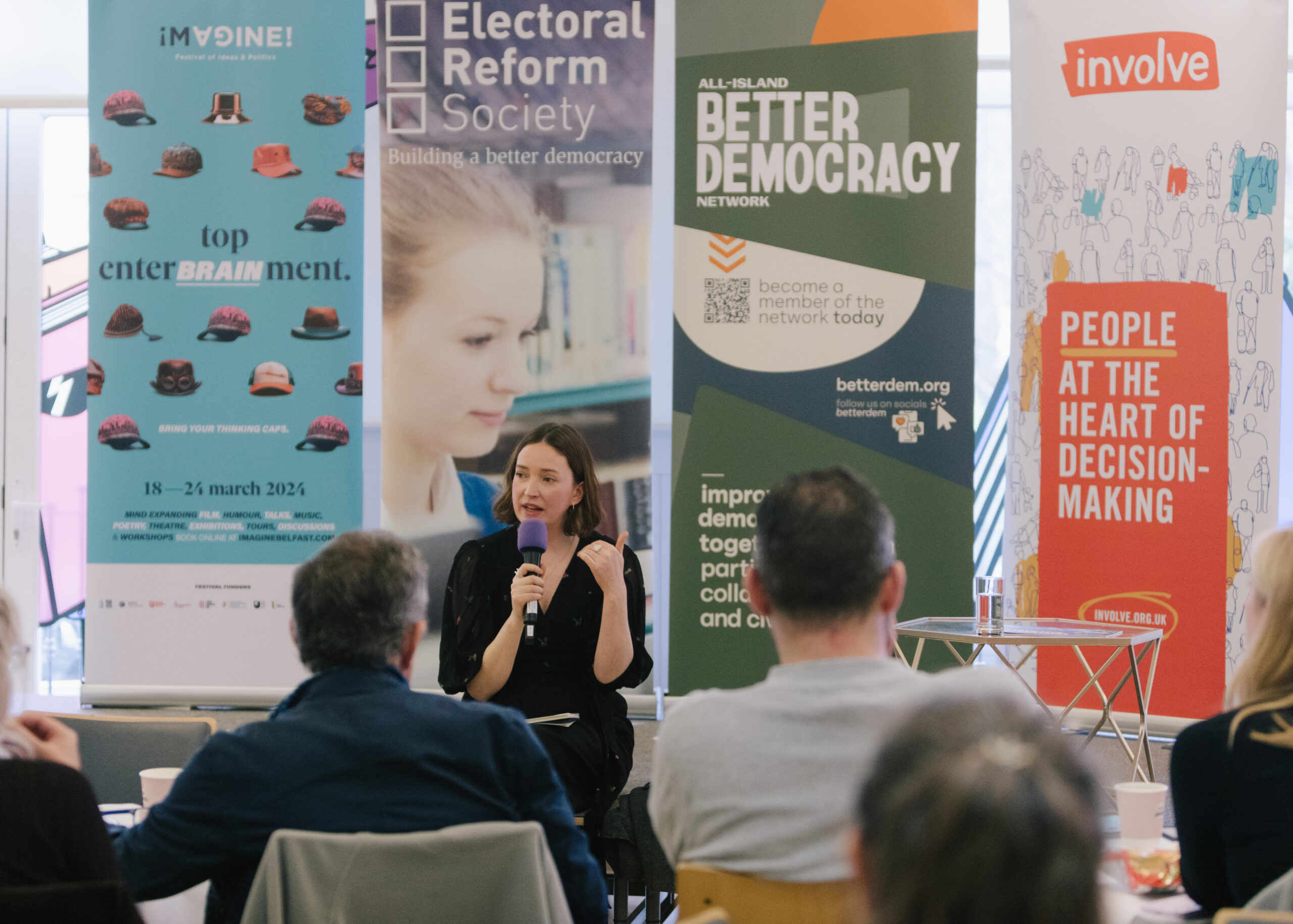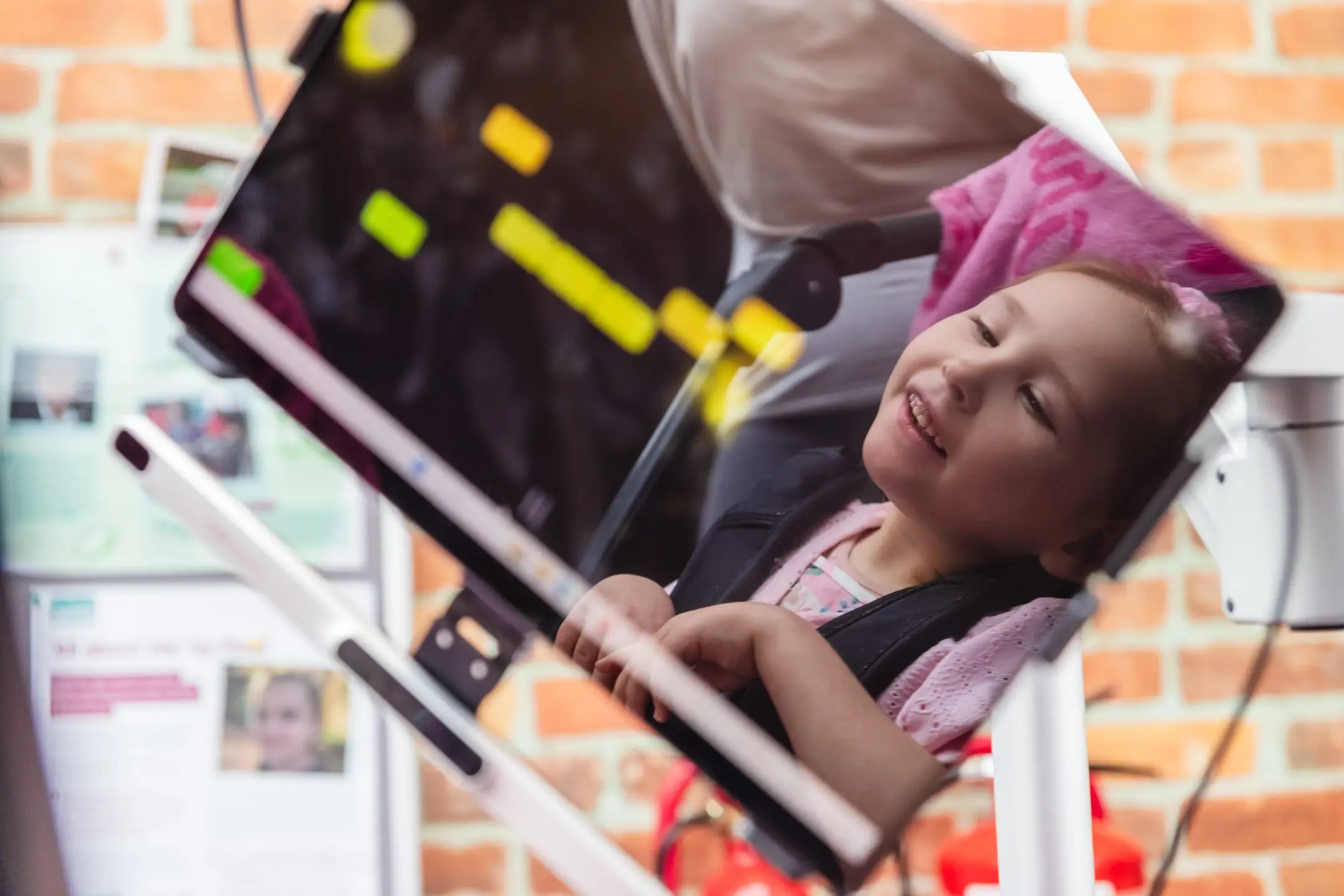Border Crossings – Building a Deliberative Democracy Together on the Island of Ireland


The Irish border is a curious thing. Both there and not there at all times. Writ large on our collective consciousness, but invisible and intangible in the daily experience of the island.
In my personal life, I traverse it regularly. I live on the opposite side of it to my family and many of my friends. I’m a Midlander who has become a southerner by moving north. Though it has been more than fifteen years since I lived there, I still feel tethered to everyday life in the south. Through my family, the reality of life in the Republic – and the way it looks different from the vantage of another place – is a constant presence. The opportunities that exist there that are missing here, and vice versa. The little differences in terminology. The relative easiness of employment, the difficulty of housing. The shared challenges: rural transport, healthcare, climate change, rising hatred and racism. The things talked about and not talked about.
In this cross-border life, it felt natural, then, to think about how my work on democracy might also cross that line on the map, towards a shared endeavour, a community of practice across the island.
This idea was driven as much by a longing to feel connected to others working in familiar contexts as by the sense of being too small, too context-bound, for the bustling democracy scene of Great Britain. It started slowly. Conversations. Drafts of ideas. Several unsuccessful funding applications.
Then in March 2024, thanks to a small grant from the St Stephen’s Green Trust, the vision became a reality and we launched the All-Island Better Democracy Network.
The idea behind the network is simple: Ireland is a small island facing the same democratic challenges as everywhere else. People who want to meet those challenges through participation and deliberation need infrastructure to connect them. The network is that infrastructure.
There are questions that do not stop at the border. The rising tides of climate and housing crises. The slow collapse of rural health services. Youth disenfranchisement, misinformation, the fraying of trust, the encroachment of far-right ideologies and racist violence.
The meta crisis is a crisis of democracy. We’re not just threatened by what we face, but by how we face it—together or apart, heard or ignored, our worlds made smaller through fear or expanded by hope and community.
We need better tools. Deliberative democracy gives us those tools. It makes room for complexity, conflict—even contradiction. It gives us a method not only for deciding, but for understanding.
Deliberative democracy – the practice of gathering ordinary people to learn, speak, and decide together – is itself a kind of border crossing. It asks us to move beyond instinct and ideology into the slower, stranger territory of listening. From ‘I know’ to ‘I wonder’. And on this island, at this particular moment, it may offer us not only a new way to decide things, but a new way to relate to each other.
Rebecca Solnit once wrote that “hope is not a lottery ticket you sit on the sofa holding… hope is an axe you break down doors with in an emergency.” On this island, deliberative democracy might be that axe, or at least the hands willing to hold it.
Across the island, I see a hunger for something different. People are tired of being ignored. Tired of shouting into the void of consultations, or watching decisions with real consequences being made without them.
But they are not tired of democracy. Not yet.
There is still belief, however fragile, that something better could be built. The evidence is growing. Deliberative processes can enhance legitimacy, promote learning, and build consensus—especially when political systems are under strain. Recent OECD studies show they can improve both the quality and legitimacy of public decisions, particularly when embedded in institutional practice.
Cross-border collaboration on deliberative democracy offers a practical and imaginative response. By working together, the two jurisdictions can share learning, test new approaches, and build a more resilient democratic culture across the island.
Ask any democracy worker around the world about Ireland, and they’ll tell you that the Citizens’ Assemblies changed everything.
They mean it literally – often pointing to the constitutional changes on same-sex marriage and abortion. But also something deeper. A sense that political questions too often reserved for closed rooms, decided by elites insulated from the realities they affect, could be handed, with care, to ordinary people.
Northern Ireland, by contrast, has not yet had a parliament-led citizens’ assembly. But something else is growing: local initiatives, citizens’ juries, participatory budgeting, community conversations. People asking not just to have a say, but to be heard and reflected in decisions.
The long legacy of peacebuilding and dialogue across difference. The truth-to-power bravery forged in the civil rights movements. These are skills that, with the right institutional support, can make an easy jump to deliberative practice.
Ireland’s Citizens’ Assembly is a remarkable political innovation. Not only has it helped change Ireland’s constitution, but it has inspired democracies across the world, including in the UK, to experiment with new ways of involving citizens.
But we cannot afford complacency. The wider impact in the Republic is more mixed. They have drawn criticism for their overuse, the tight hold government has kept on them, and disregard of specialist expertise such as that held by Involve. Most interesting for me is that, despite the proximity of a celebrated national prototype, local governments in Ireland have not embraced citizen deliberation in the way that counterparts in England or Europe have. Participation remains consultative rather than deliberative. The main statutory mechanism for local public involvement – Public Participation Networks (PPNs) tend to rely on organised groups rather than random selection, and lean towards feedback over deliberation.
In Northern Ireland, democratic infrastructure is extremely weak, with key elements of the Good Friday/ Belfast Agreement that would have carved out civic space still unfulfilled 25 years later. Despite subsequent commitments, issues of existential importance are still put to the public only after key decisions have been made. The statutory consultation process works for no one. Trust is low across all communities. Policy making is siloed, slow, and ineffective. Crucial infrastructure – from cycle lanes to water to clean energy – is delayed because of political deadlock or because people reject decisions made without them.
And yet, on both sides of the border, there are stories of brilliance. Of community-level work involving people often excluded from decision-making. What if those stories were the ones we told about democracy here? What if they were the stories we built from?
To see these two stories of democracy side by side is not to invite comparison, but curiosity. What have we each learned? Where are we strong? Where are we struggling? What might we build if we worked together?
Yes, there are challenges. Two jurisdictions, two systems. Political instability. Sovereignty sensitivities. Risks of tokenism.
But these are the very reasons to invest in this work. Deliberation builds understanding. It holds complexity. It restores trust.
Cross-border collaboration can help raise standards, avoid duplication, and build shared capacity.
Democracy on this island is changing. Old certainties are shifting. New generations are coming of age, bringing with them fresh hope and healthy skepticism. There’s a chance to shape what comes next, deliberately and together.
This is not about constitutional futures. Not directly. It’s about how we make decisions now. It’s about building a democratic culture that’s inclusive, resilient, capable of holding complexity. If governments, civil society, and institutions North and South are willing, deliberative democracy could be a space of shared innovation.
We have come to the end of our first round of funding, which has enabled us to plant the seeds of cross border working on deliberative democracy. We have a network, a membership of over 200 people, an online presence, and nearly a dozen events under our belt that brought people together, in Dublin, Belfast, and on the shores of Lough Neagh to imagine, discuss, learn and share.
And ends are also beginnings. We are now looking for new supporters to help us scale up and expand our work with the All-Island Better Democracy Network.
- We want to map what’s already happening and shine a light on it. Often the work is already there – in community groups, in border towns, in quiet efforts by civil servants and local leaders – but it goes unseen, unsupported, unconnected. The Better Democracy Network can amplify and celebrate that work.
- We want to develop a community of practice – through structured exchanges, the Network could support knowledge sharing, evaluation, and the development of common standards for inclusive practice.
- We want to support practitioners to pilot, test, share, fail, and try again. To recognise each other’s risk-taking, successes, and disappointments. Because democracy is not a final product. It’s a practice.
- We want to empower citizens across this island with the tools to be active participants in the decisions that affect them, so that changes with institutions are met by capable communities ready to deliberate and advocate for better democracy.
Deliberation won’t resolve every divide on this island. But at a moment where new cracks are appearing, it might help us approach differences in a new way – with more generosity in how we listen and more care in how we speak. Not to rewrite the past, but to work with it, across borders, toward a future built in common.
Rebekah McCabe is Head of Northern Ireland for Involve, the UK’s leading public participation and deliberative democracy organisation, and founder of the All Island Better Democracy Network.


